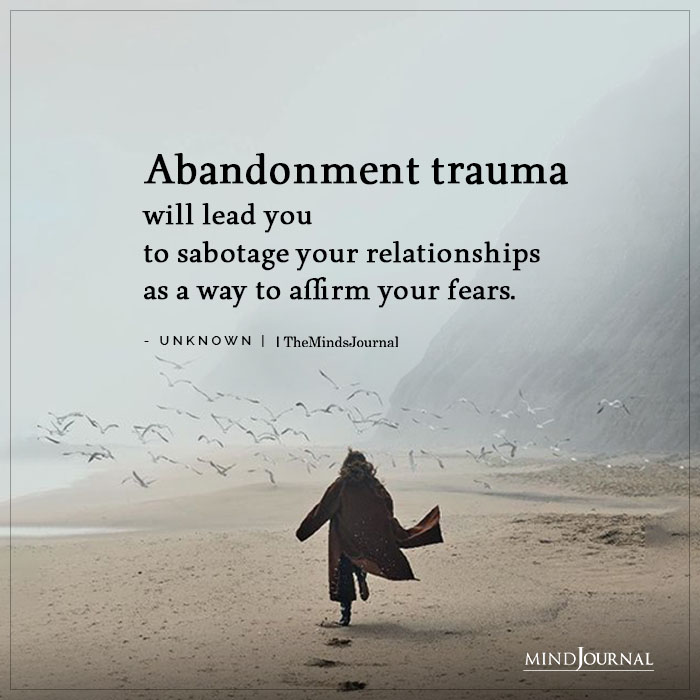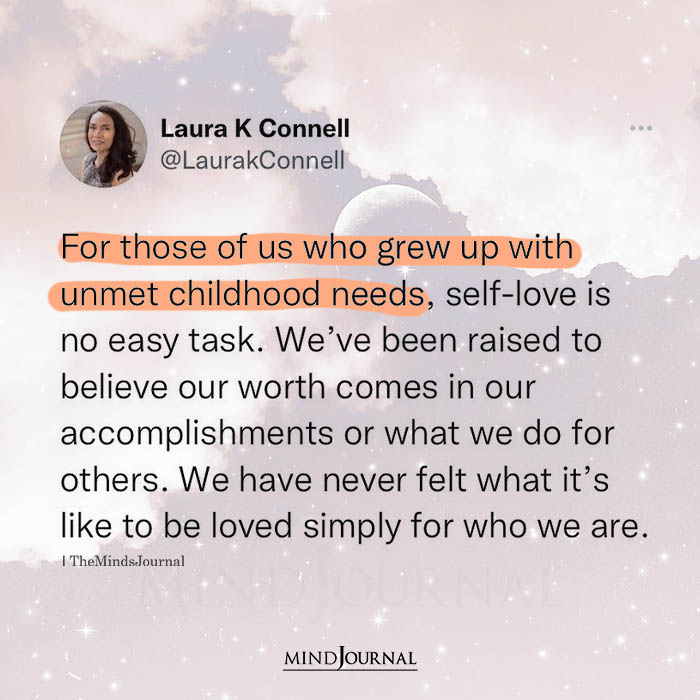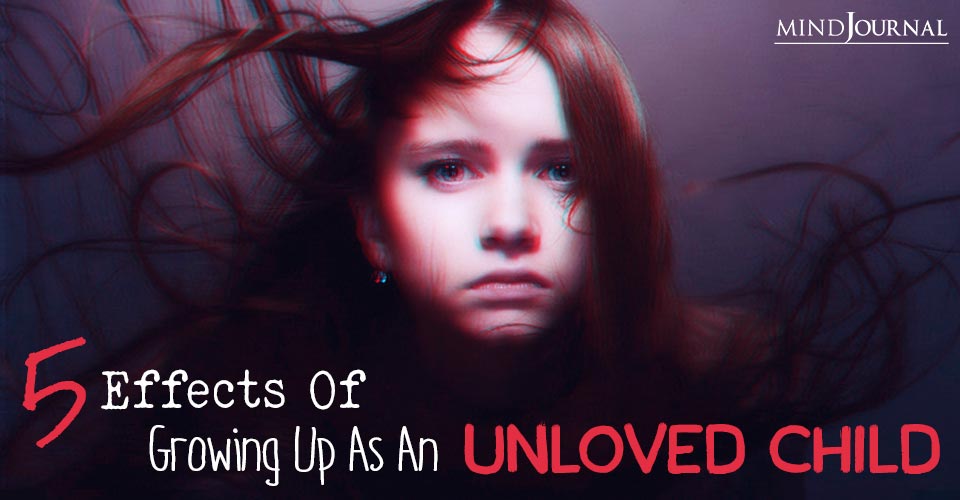Childhood is a stage for growth not only physically but also emotionally. So when a child is not loved by their parents, they end up growing up with a lot of pain and heartbreak. It is not a rare phenomenon for an unloved child to battle with emotional and behavioral problems, even when they are an adult.
When we are born we have no sense of self. We can’t tell ourselves as being different from our mothers. As infants, our sense of self is totally enmeshed by our parents.
If we receive consistent love and support during our childhood, we grow up with a feeling that we are valuable and loved; we have an increased ability to solve our problems, form healthy and meaningful relationships, and an overall sense of well-being and security.
If we receive inconsistent love or face excessive humiliation or trauma during our childhood, we grow up with a poor sense of self, fear of failure, lack of trust, and a tendency to enter into toxic relationships.
If a child notices that his parents do not have time for him or are inconsistent in their ways towards his needs, he develops a feeling that he must be worthless and good for nothing. The effects of childhood emotional neglect are immense, and being an unloved child can take a massive emotional, mental, and psychological toll on a person.
Related: 5 Ways Childhood Emotional Neglect Causes Depression in Adulthood
5 Characteristics Of An Unloved Child
1. Fear of abandonment, unhealthy attachment styles, and toxic relationships
A child who gets consistent love and support during his childhood grows up with a healthy attachment style. They have a deep internal sense of self-worth and value and don’t suffer from insecurity and low self-esteem.
They know that they are worthy of being loved and cared for, that they deserve to be in stable relationships, and that this world is a safe place to explore and learn.
But an unloved child, who received inconsistent love and support during their childhood grows up with an insecure attachment style. They either become anxiously attached or totally avoidant in their relationships.
- Anxious attachment style
When children do not get the right amount of love and support from their parents, it gives off the message that they are not worth their time and importance. They feel worthless and unnecessary, and gradually develop anxiety, which then spills into their adult relationships.
When they are in a relationship, they will cling to their partners for constant attention and will be perennially scared that they will be abandoned for someone else. Their anxiety becomes so intense, that it makes it difficult for them to be in healthy, long-term relationships.
- Avoidant attachment style
If a child grows up with parents who are not there to take care of the child, they learn to take care of themselves, which results in an avoidant attachment style in adulthood.
They will try to be as self-reliant as possible and will evade any sort of intimacy and dependency in relationships. They will avoid opening up on deeper and more intimate levels in relationships to avoid possible hurt.
The basis of both anxious and avoidant attachment styles is a fear of abandonment that stems from a lack of parental love in childhood. The partners we choose in adult relationships are subconsciously a replica of our parents because we seek the familiar.
It is important to acknowledge our unhealthy patterns and understand where they stem from so that we can consciously work towards healing them and form healthy relationships instead of toxic ones.

2. Feeling extreme emotions and having an all-or-nothing mindset.
It is during childhood, that children get help from their parents to learn to recognize and express their emotions in a safe environment. If their parents are not available during this time, children will have a hard time recognizing their emotions and expressing them in a healthy manner. How your parents treated you as a child, determines a lot about emotional health.
As an unloved child becomes an adult, they will find it hard to regulate their emotions in the right way; they will either shut themselves off from their emotions completely or they will express them in an exaggerated and uncontrolled manner. Either way, the way they express their emotions is never healthy or normal.
3. They have an unhealthy ego.
A child starts to develop their ego/sense of self around two years of age. The time and attention parents devote to their children indicates to them the degree to which they are valued by their parents.
If they are provided love, attention, affection, and support consistently during this time, they will begin to internalize those feelings, and they will grow up believing that they are worthy and valuable. Eventually, when they become an adult, they will be confident and will have a healthy ego.
However, if a child does not get these things consistently during their growing years, they begin to feel that there is something wrong with them and they eventually grow up to be an adult with a poor and unhealthy ego.
Related: This Is How Emotional Neglect Affects A Child
4. Trust issues and an inability to set healthy boundaries.
When your parents stand by you and provide loving care and support, you grow up with a deep belief that this world is a safe place and that your needs will be provided for. You grow up with the ability to trust people and believe in the general goodness of the world.
But if someone has faced abandonment by their parents or if their parents were not there to provide them consistent love and support during their growing years, they grow up with a feeling that this world is a threatening and dangerous place and that anyone can leave them at any time.
They have trouble trusting people even in close relationships and friendships due to this fear of loss and abandonment, and this leads to them having poor boundaries.
They will take on whatever boundaries they observed the most in their childhood. If their family had non-existent or dysfunctional boundaries, they will take on that behavior in their adulthood.
Ultimately an unloved child will view healthy boundaries created by friends as rejection and abandonment and will take them personally.

5. A crippling fear of failure.
The major difference between a child who is loved and one who is unloved is that the one who gets consistent love is aware of their intrinsic value even with all the flaws and imperfections they might have.
As a result, they are not scared of failure because failure does not define their self-worth. They are very resilient and can overcome challenges easily. They want to explore life, grab new opportunities, and are not afraid of taking risks.
But the one, who has received inconsistent love, grows up to believe that they are not good enough and they try hard to avoid failure at any cost. This is because they think that failure is a reflection of them being not good enough. They become too scared to step out of their comfort zone and risk anything.
Related: Emotionally Neglected By Parents: The Lifelong Effects Of Childhood Neglect
3 Things To Keep In Mind While Healing From Childhood Emotional Neglect
1. Reparenting your inner child.
If you were an unloved child, your inner child will be looking for love, and validation forever. You can’t go back and change your parents nor can you change what you went through. But what you can do is reparent your inner child by giving it the love and compassion it’s searching for.
If you take care of yourself and give yourself the love you never got from your parents, you will slowly start to heal from your childhood wounds. Taking care of your inner child is the key to being happy and at peace.
2. Don’t hesitate to ask for help.
If you didn’t get love and affection as a child, you grow up feeling a constant void that you always seek to fill, with no time left to focus on your dreams, goals, or life. You’re constantly preoccupied with thoughts of how incomplete, and worthless you are.
It is essential to create a solid internal sense of self to fill this void and live a happy and content life, and that is exactly what therapy helps you to do. Speak to a therapist, pour your heart out, and take the necessary steps towards healing.
Related: Things You Can Relate To If You Were Emotionally Neglected As A Child
3. Cultivate self-discipline and set healthy boundaries.
Cultivating self-discipline and knowing how to set healthy boundaries can help you move on from the pain you suffered in childhood. Learn to discern when to put yourself first and when to extend yourself to others. Schedule work and fun, me-time, and relationship time and avoid the tendency to operate in extremes.
Being the unloved child is never easy, but it’s up to you to decide how you want to spend the rest of your life. Do you want to hold onto the pain of your childhood, or do you want to heal, move on and build a life for yourself that your parents could never give you? Your answer to this question will decide the kind of life you will ultimately have.
Want to know more about how it feels to be an unloved child? Check this video out below!













Leave a Reply